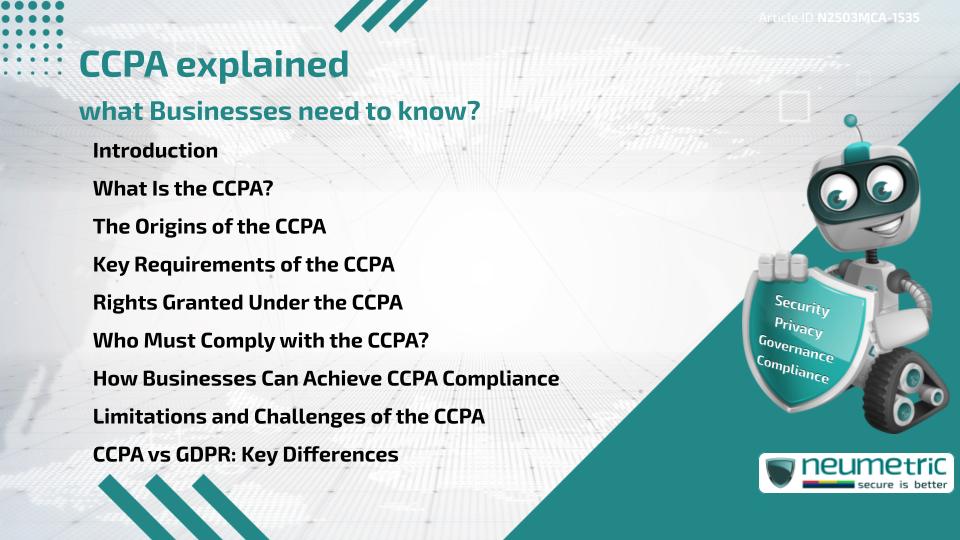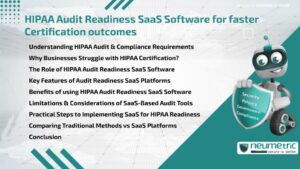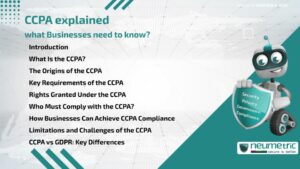Table of Contents
ToggleIntroduction
The California Consumer Privacy Act [CCPA] is a landmark Privacy Law that enhances Consumer Rights & imposes strict requirements on businesses handling Personal Data. Enacted in 2018 & effective since 2020, it grants California Residents greater control over their Personal Information. This article provides a comprehensive breakdown of CCPA, covering its history, key provisions & Compliance Requirements.
What Is the CCPA explained?
The CCPA is a State-level Privacy Regulation designed to protect the Personal Data of California Residents. It mandates Transparency from businesses & ensures Consumers have the right to Access, Delete & Restrict the sale of their information. Often compared to the General Data Protection Regulation [GDPR] in Europe, the CCPA is the most extensive Data Privacy law in the United States.
The Origins of the CCPA explained
The CCPA emerged in response to growing concerns about Data Privacy, particularly after major Data Breaches & the misuse of Consumer Information by large Tech companies. California lawmakers introduced the Act to empower Consumers & increase Accountability for businesses that collect & use Personal Data.
Key Requirements of the CCPA explained
Businesses subject to the CCPA must adhere to several important obligations, including:
- Providing clear disclosures about Data Collection & Usage
- Offering Consumers the right to opt out of Data sales
- Implementing measures to respond to Consumer Data requests
- Ensuring Security Measures are in place to protect Consumer Data
Rights Granted under the CCPA explained
The CCPA grants Consumers four major rights:
- Right to Know: Consumers can request details about the Data collected on them.
- Right to Delete: Individuals can ask businesses to erase their Personal Data.
- Right to Opt Out: Consumers can prevent the sale of their Data to Third Parties.
- Right to Non-Discrimination: Businesses cannot penalize Consumers for exercising their CCPA rights.
Who Must Comply with the CCPA?
The CCPA applies to businesses that meet at least one of the following criteria:
- Annual gross revenue exceeding $25 million
- Handles Data of 50,000 or more Consumers, Households or Devices
- Derives 50% or more of its annual revenue from selling Consumer Data
Even companies outside California must comply if they collect or process the Data of California Residents.
How Businesses Can achieve CCPA Compliance
To comply with the CCPA, businesses should:
- Conduct Data Mapping to understand what Personal Information they collect
- Update Privacy Policies with clear CCPA disclosures
- Implement Systems to handle Consumer Data requests
- Train Employees on CCPA Compliance Requirements
- Strengthen Data Security Measures to prevent breaches
Limitations & Challenges of the CCPA explained
While the CCPA strengthens Consumer Privacy rights, it has limitations. Critics argue that:
- Compliance can be costly for Small Businesses
- It only applies to large companies, leaving smaller entities unregulated
- Loopholes exist, such as exemptions for certain industries
- Enforcement can be challenging without sufficient oversight
CCPA vs GDPR: Key Differences
Though the CCPA & GDPR share similarities, key differences include:
- Scope: GDPR applies globally to any business handling EU citizens’ Data, while the CCPA is limited to California Residents.
- Legal Basis: GDPR requires businesses to have a legal reason for Data processing, whereas the CCPA does not impose such restrictions.
- Consumer Rights: GDPR includes additional rights like Data Portability & Rectification.
Conclusion
The CCPA is a major step toward stronger Consumer Privacy in the United States. It empowers Individuals by granting them control over their Personal Data while holding businesses accountable for Data practices. However, it has limitations & challenges that impact both Consumers & businesses.
Takeaways
- The CCPA enhances Consumer Privacy rights for California Residents.
- It mandates Transparency, Consumer Control & strict Compliance measures for businesses.
- The law applies to companies meeting specific revenue & Data-handling criteria.
- Businesses must adopt Privacy Policies, Security Measures & Data Management strategies to comply.
- While the CCPA is a powerful law, it has limitations in Scope & Enforcement.
FAQ
What is the main purpose of the CCPA?
The CCPA aims to give California Residents greater control over their Personal Data by requiring businesses to provide Transparency & Consumer Rights.
Does the CCPA apply to businesses outside California?
Yes, if a business collects Data from California Residents & meets certain revenue or Data-handling thresholds, it must comply with the CCPA.
What penalties do businesses face for CCPA violations?
Businesses can face fines of up to $ 7,500 per intentional violation and $ 2,500 per unintentional violation, along with potential lawsuits from Consumers.
How does the CCPA affect Consumers?
Consumers gain more control over their Personal Information, including the right to Access, Delete & Opt Out of Data Sales.
How is the CCPA different from the GDPR?
While both laws focus on Data Privacy, GDPR has broader Global implications & stricter Consent requirements, whereas the CCPA is limited to California & focuses more on Consumer Rights.
Can businesses sell Consumer Data under the CCPA?
Yes, but Consumers have the right to opt out of the sale of their Personal Data & businesses must provide a clear mechanism to do so.
What should businesses do to comply with the CCPA?
Businesses should update their Privacy Policies, implement Data Request Systems, provide opt-out options & strengthen Security Measures.
Does the CCPA apply to Small Businesses?
The CCPA primarily applies to larger businesses meeting specific thresholds, but Small Businesses dealing with large amounts of Personal Data may still be affected.
What industries are exempt from the CCPA?
Certain industries, such as Healthcare Providers covered by HIPAA, Financial Institutions under the GLBA & Government Agencies, may be exempt from some CCPA requirements.
Need help?
Neumetric provides organisations the necessary help to achieve their Cybersecurity, Compliance, Governance, Privacy, Certifications & Pentesting goals.
Organisations & Businesses, specifically those which provide SaaS & AI Solutions, usually need a Cybersecurity Partner for meeting & maintaining the ongoing Security & Privacy needs & requirements of their Clients & Customers.
SOC 2, ISO 27001, ISO 42001, NIST, HIPAA, HECVAT, EU GDPR are some of the Frameworks that are served by Fusion – a centralised, automated, AI-enabled SaaS Solution created & managed by Neumetric.
Reach out to us!





